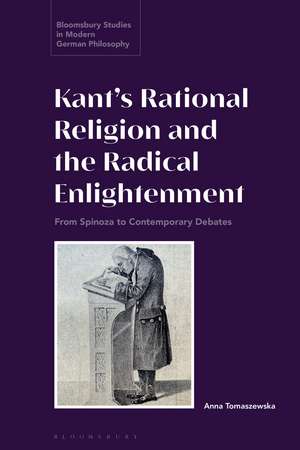Kant’s Rational Religion and the Radical Enlightenment: From Spinoza to Contemporary Debates: Bloomsbury Studies in Modern German Philosophy
Autor Dr Anna Tomaszewskaen Limba Engleză Paperback – 21 feb 2024
| Toate formatele și edițiile | Preț | Express |
|---|---|---|
| Paperback (1) | 191.31 lei 6-8 săpt. | |
| Bloomsbury Publishing – 21 feb 2024 | 191.31 lei 6-8 săpt. | |
| Hardback (1) | 539.64 lei 6-8 săpt. | +114.86 lei 4-10 zile |
| Bloomsbury Publishing – 24 aug 2022 | 539.64 lei 6-8 săpt. | +114.86 lei 4-10 zile |
Preț: 191.31 lei
Nou
Puncte Express: 287
Preț estimativ în valută:
36.61€ • 37.82$ • 30.47£
36.61€ • 37.82$ • 30.47£
Carte tipărită la comandă
Livrare economică 25 martie-08 aprilie
Preluare comenzi: 021 569.72.76
Specificații
ISBN-13: 9781350195912
ISBN-10: 135019591X
Pagini: 232
Dimensiuni: 156 x 234 x 25 mm
Greutate: 0.34 kg
Editura: Bloomsbury Publishing
Colecția Bloomsbury Academic
Seria Bloomsbury Studies in Modern German Philosophy
Locul publicării:London, United Kingdom
ISBN-10: 135019591X
Pagini: 232
Dimensiuni: 156 x 234 x 25 mm
Greutate: 0.34 kg
Editura: Bloomsbury Publishing
Colecția Bloomsbury Academic
Seria Bloomsbury Studies in Modern German Philosophy
Locul publicării:London, United Kingdom
Caracteristici
Traces the Spinozistic resonances in Kant's philosophy of religion to highlight that the distinction between the Enlightenment's radical and moderate branches is not clear-cut
Notă biografică
Anna Tomaszewska is Assistant Professor in the Department of History of Philosophy at the Institute of Philosophy, Jagiellonian University, Poland.
Cuprins
Acknowledgements Introduction1. Towards the Radical Enlightenment: Setting the Stage for a Debate2. Spinoza's God in Kant's Pre-Critical Writings: A Departure from Theistic Metaphysics3. The Moral Atheist and a Schwärmer. Kant's Critique of Spinoza4. The Primacy of the Practical in Kant and Spinoza5. Kant's Religious Rationalism and Spinoza6. The Enlightened Church. Kant's Contribution to Debates on Secularization7. The Divinity of Reason in the Opus postumumConcluding RemarksNotesBibliographyIndex
Recenzii
Anna Tomaszewska's book offers an accurate, original, compelling reassessment of Kant's thinking about religion, against the background of the radical Enlightenment and its impact on Kant's mind. This masterly account, which has mastered Kant in many ways, provides fresh food for thought on the relationship between the Enlightenment and religion.
By examining Kant's religious thought through the lens of recent debates about the Enlightenment, Tomaszewska offers valuable insight into the relationship between divine transcendence and human autonomy. Impressively grounded in the sources, the work challenges current views concerning Kant's religious thought and, more broadly, concerning the very idea of secularization.
This book offers a valiant attempt to synthesize traditional interpretations of Kant's theory of religion, as radically reductionist, and recent readings emphasizing his moderate, affirmative tendencies. Skillfully balancing various divergent interpretations of Enlightenment approaches to religion, Tomaszewska judiciously assesses how Kant's position relates to those of his forerunners, especially Spinoza.
By examining Kant's religious thought through the lens of recent debates about the Enlightenment, Tomaszewska offers valuable insight into the relationship between divine transcendence and human autonomy. Impressively grounded in the sources, the work challenges current views concerning Kant's religious thought and, more broadly, concerning the very idea of secularization.
This book offers a valiant attempt to synthesize traditional interpretations of Kant's theory of religion, as radically reductionist, and recent readings emphasizing his moderate, affirmative tendencies. Skillfully balancing various divergent interpretations of Enlightenment approaches to religion, Tomaszewska judiciously assesses how Kant's position relates to those of his forerunners, especially Spinoza.








